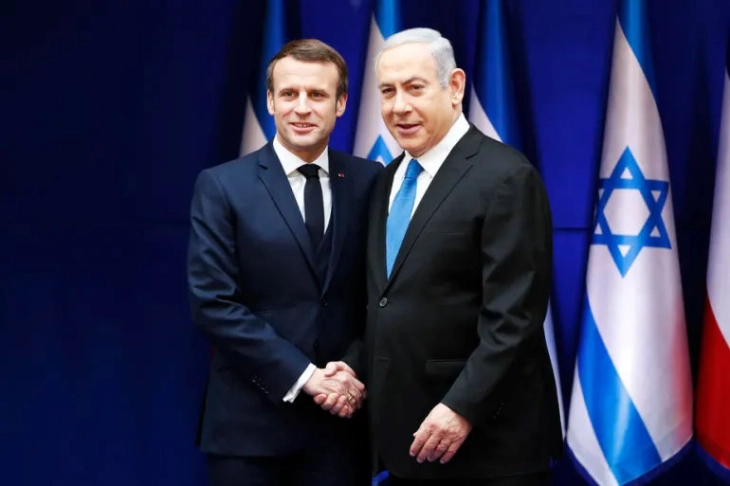Macron and Netanyahu discuss Iran and war in Ukraine
- French President Emmanuel Macron and Israel's Prime Minister Benjamin Netanyahu discussed Iran's nuclear programme and Russia's war in Ukraine at a meeting in Paris.

Paris, 3 February 2023 (dpa/MIA) - French President Emmanuel Macron and Israel's Prime Minister Benjamin Netanyahu discussed Iran's nuclear programme and Russia's war in Ukraine at a meeting in Paris.
Macron stressed the need for resolute action in view of Iran's progress with its nuclear programme, which will "inevitably have consequences if continued," the Élysée Palace said in a statement after the meeting on Thursday evening.
Macron also complained about Tehran's lack of transparency with the International Atomic Energy Agency (IAEA).
Netanyahu and Macron also expressed deep concern over Iran's destabilizing activities in the region, Paris sources said.
Macron stressed that Iranian support for Russian aggression in Ukraine is increasingly exposing Tehran to sanctions and isolation. Macron and and Netanyahu also spoke about efforts to deal with the international consequences of Russia's war in Ukraine.
The Israeli side said that the two leaders discussed ways to confront the Iranian nuclear threat "at length," adding that Netanyahu "called for imposing significant sanctions on the Iranian regime and for the Revolutionary Guards to be included on the EU terrorism list."
The leaders also discussed the Middle East "and the need to maintain regional stability, especially in Lebanon, and opportunities to expand the circle of peace," Netanyahu's office said in a tweet.
Macron also expressed concern about the planned controversial restructuring of the judiciary in Israel, according to a report by the newspaper Le Monde on Friday.
If the reform were to be realized in its current form, Paris would have to conclude that Israel had broken away from a common understanding of democracy, Marcon said according to the report.
The Times of Israel also reported on Friday, citing Paris government sources, that Macron had criticized the reform, saying it risked creating an unprecedented crisis for Israel.
Israel's Justice Minister Yariv Levin wants to deliberately weaken the country's Supreme Court. A majority in parliament would then be able to pass laws, even if the Supreme Court considered them unconstitutional. Levin accuses the court of excessive interference in political decisions.
Some experts warn that the implementation of the plans could endanger democracy in Israel. The plans have been causing protest for weeks.
The meeting took place against the background of growing tensions in the Middle East.
Macron assured Netanyahu of France's full solidarity with Israel after a series of recent attacks from the Palestinian side, but also stressed the importance of "avoiding any moves likely to fuel the cycle of violence which has already claimed too many innocent victims among Palestinian and Israeli civilians," the Élysée said.
Macron also highlighted that France backs the status quo in Jerusalem's holy sites and firmly opposes the continuation of settlement expansion, which undermines the prospect of a future Palestinian state as well as Israel's hopes for peace and security, the Élysée said.
Israel took over the West Bank and East Jerusalem in 1967. Today, more than 600,000 Israeli settlers live there. The Palestinians claim the territories for an independent state, with East Jerusalem as its capital.
The Israeli government continues to expand settlements on land designated to be part of a Palestinian state - actions the UN Security Council sees as a violation of international law.







